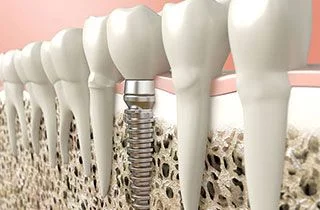The most modern way to replace lost teeth is dental implantation, and numerous advantages can be listed for it. However, there are also some disadvantages. This article will present the pros and cons of dental implants.
In this article, you will read about:
- What are the dental implants – is it a good option?
- Dental implant pros
- Why would a dentist not recommend an implant? – dental implant cons
What are the dental implants – is it a good option?
Yes. Dental implants are a good option in most cases. Dental implantation is a modern oral surgical/dental procedure to replace lost teeth. It can be applied when even the tooth root has to be removed. The implant in this procedure is the artificial root, which replaces the original root either immediately or at a later time. The artificial root is a threaded screw made of titanium. The dentist inserts this into the jawbone. After a healing period, he fixes a superstructure onto the implant. On this, he will then place the required tooth replacement. This can be a crown, a bridge, a cantilever bridge, etc. More about the procedure of dental implants
Dental implant pros
First, let’s see arguments in favour of dental implants.
- To replace a single tooth, an implant is as good a solution as a bridge. Even a better one. To fix the bridge, the dentist must grind down the teeth on both sides of the gap, even if they are perfectly healthy. With the use of implants, there is no need for such grinding. Therefore, implants protect intact teeth.
- If a patient has removable tooth replacement, without having any natural teeth in the oral cavity, this can be made more stable with some implanted artificial roots, even during eating and speaking. This way, the everyday life of the patient will be more comfortable.
- Another very important aspect is that the artificial root and the implant built on it are fixed in the jaw. This means that they stimulate the bone and the gum during chewing. This can prevent the atrophy of the jaw and the gum. It also prevents the distortion of the face (which can be the result of facial dilapidation). It also helps avoid numerous diseases and complications related to tooth loss.
- The successfully fixed (ossified) implant can offer a tooth-replacing solution for many decades or even a whole lifetime.
- The teeth built on the implants are like natural teeth, both in appearance and in function. They enable forceful chewing and biting, which has a positive effect on the functioning of the complete digestive system and body.
Why would a dentist not recommend an implant? – Dental implant cons
Having seen numerous arguments for the dental implant technique, let’s see the potential risks and complications of this procedure. We will also look at contraindications and cases when it is not possible to perform the implantation.
- It is not possible to implant an artificial root in case of certain diseases of the immune system and the haematological system, as well as some chronic infectious diseases.
- Diabetes and smoking make the ossification of the implant more difficult in the jaw.
- As with all surgeries, complications can arise during the implantation of the artificial root, especially inflammation in the soft tissues around the artificial root and the bone tissue. This process can lead to the loosening of the implants or even the loss of the implant. This process, called peri-implantitis by professionals, can start in the first month after the surgery or later, around the solidly fixed implant. In the latter case, the cause for inflammation is usually overburden, early burden or a lack of effective cleaning.
- The jaw bone gets thinner around the place of teeth extracted a long time before the implantation of the artificial root. Therefore, the substance of the bone is not enough to fix the artificial root. In this case, lifting the paranasal sinus and osteoplasty are necessary before implanting the artificial root.
- Implants and the prostheses mounted on them require more attention, more effective cleaning and greater care than usual. Otherwise, a foudroyant inflammatory process can occur, which can result in loosening or loss of implants. Read more about problems with dental implants
- Compared to more traditional methods, this technology is more expensive. Dental implants cost
Can a dental implant cause problems years later?
Yes, dental implants can cause problems even years later, although this is relatively uncommon if the procedure was done correctly and proper oral hygiene is maintained. Some long-term complications include:
- Peri-implantitis (inflammation and bone loss around the implant). Read more about reversing dental bone loss, and dental bone loss preventation
- Gum recession or aesthetic issues
- Implant loosening or failure due to bone loss
- Nerve damage from poor placement (rare)
- Fracture of the implant or crown
These issues often stem from poor oral hygiene, smoking, chronic health conditions (like diabetes), or excessive bite pressure. Regular check-ups and cleanings are key to catching and preventing complications.


